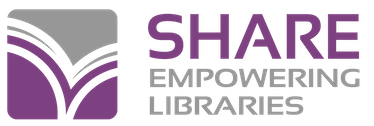Library directors must contact the SHARE Assistant Director or his/her designee to identify staff members who will be catalogers and barcoders and require initial training. Please complete the SHARE Bibliographic Services Training Contract and email it to the SHARE Assistant Director at jbaugh@illinoisheartland.org
Certification Levels
Barcoder
Barcoders have the knowledge/training to search the local database to identify a matching record. If a matching record is found, the barcoder attaches an item record. If a matching record is not found, the item is either given to a staff cataloger, is sent to a SHARE Cataloging Center, or an Express Cataloging Request is submitted. Barcoders may not edit bibliographic records.
Required training
- Barcoding Certification Training
- Barcoding—This course covers searching the local database for a matching bibliographic record, as well as creating, editing, and deleting item records in the local database.
- This training can be completed asynchronously on the SHARE Training site, via Zoom (classes are scheduled quarterly), or in person with SHARE Staff (scheduled as needed/requested).
- Barcoding Recertification Training
- Barcoders are required to complete Barcoding Recertification Training every two years to maintain their barcoding status. The renewal date is based on either the date that barcoding permissions were first assigned or the last time Barcoding Recertification Training was successfully completed.
Directors - Please submit the SHARE Bibliographic Services Training Contract to the SHARE Assistant Director, Jennifer Baugh, before having staff enroll in Barcoder Training. Forms should be emailed to jbaugh@illinoisheartland.org
Cataloger
Certified catalogers have the knowledge and training to perform copy and original cataloging in addition to the skills required for Barcoding Certification. Certified catalogers may bring records into the local database from OCLC and may edit bibliographic records in the local database in accordance with SHARE cataloging policies. This level may also edit OCLC cataloging records, including upgrading less-than-full-level records via the OCLC Expert Community functionality.
SHARE Certified Catalogers are not required to do original cataloging but may create original records if desired. Cataloging Certification training includes copy and original cataloging.
Required training
- Barcoding—This course covers searching the local database for a matching bibliographic record, as well as creating, editing, and deleting item records in the local database.
- This training can be completed asynchronously on the SHARE Training site, via Zoom (classes are scheduled quarterly), or in person with SHARE Staff (scheduled as needed/requested).
- Cataloging Certification course—This course is fully asynchronous and is hosted on the SHARE Training Site. This course must be completed prior to entering the review period with a SHARE Cataloger.
- Review Period with a SHARE Cataloger—once coursework is completed, catalogers-in-training will be assigned to a SHARE Cataloger for their review period. This period will consist of reviewing bibliographic records for all formats in the following order.
- Books
- Audiobooks/CDs
- DVDs
- Videogames/Electronic Devices
- Kits/Realia/etc.
Catalogers-in-training will not advance to the next format until their reviewer is confident in their ability to catalog the current format to the standards required by SHARE and OCLC.
Limited cataloger permissions will be assigned upon completion of the book cataloging review period. This limited set of permissions will allow staff to import book records, but nothing else. Once these permissions are assigned, the annual CE hour requirement will take effect. SHARE Certified Catalogers are required to meet the ongoing requirement of 15 hours of cataloging-related CE each fiscal year (July 1-June 30). For new catalogers-in-training, the CE hour requirement may be pro-rated for the first fiscal year, depending on when permissions are assigned.
Additional requirements—cataloging libraries
Software
- OCLC Membership – Cataloging libraries must maintain an OCLC membership that includes access to cataloging software (OCLC Connexion Client). The Illinois State Library’s OCLC contract includes this software.
- If you are not sure if you have this subscription or have questions about it, please reach out to the SHARE Assistant Director, Jennifer Baugh, at jbaugh@illinoisheartland.org.
- MARC Report – Required for catalogers-in-training. This is free software that helps identify errors in MARC records.
- RDA Toolkit – optional for cataloging libraries to have a subscription
Other
Barcoding A libraries may become cataloging libraries the next fiscal year after a cataloger is certified. Barcoding B libraries may change to a cataloging library at any time after completion of step 10.
Amended 1/28/2026
